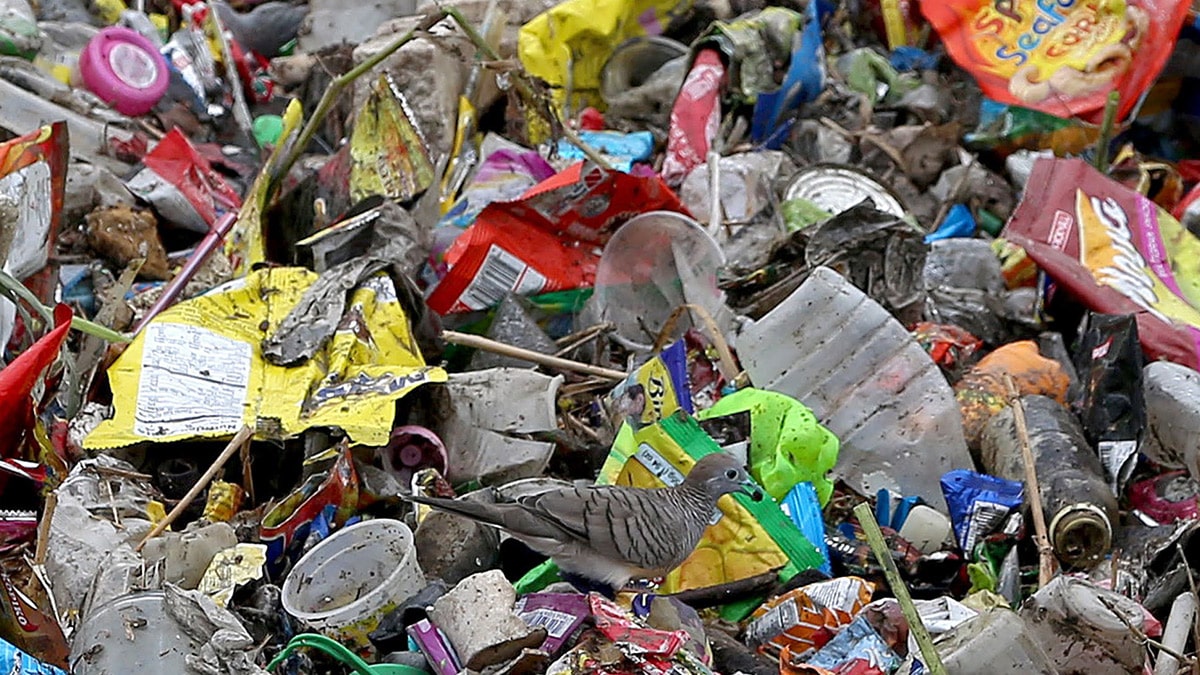
MICROPLASTICS GALORE A zebra dove looks for food among piles of garbage in Taguig City. —Richard A. Reyes
MANILA, Philippines — The Court of Appeals (CA) has ordered the National Solid Waste Management Commission (NSWMC) to come up with a list of products deemed harmful to the environment within six months, in line with its mandate under the Ecological Solid Waste Management Act enacted over two decades ago.
In a 44-page decision dated July 9, the CA’s Former Tenth Division Special Division of Five granted the privileges of the writs of kalikasan and continuing mandamus to more than 50 environmental groups and individuals, particularly, their prayer to compel the commission and its member agencies to formulate a list of nonenvironmentally acceptable products (NEAP).
READ: Mindset change on waste management
“We cannot emphasize enough that it has been more than 20 years since RA 9003 was passed. Children born when the law was passed were already eligible to vote in the last general election … Respondents, particularly NSWMC, cannot be allowed to continue to drag their feet in complying with their statutory duty,” the appeals court said in the ruling penned by Associate Justice Ruben Reynaldo Roxas.
In addition to formulating a NEAP list, the CA also ordered the commission to submit annual reports on the status of the implementation of the list.
READ: Running out of landfills
Plastic pollution
The case stemmed from the Supreme Court’s 2021 decision to grant the petition for a writ of kalikasan and continuing mandamus filed by more than 50 environmental groups and advocates against the government for its alleged failure to address the plastic pollution problem in the country.
The high court referred the case to the CA for acceptance of the respondents’ submissions, hearing and rendition of judgment on whether the petitioners, led by Oceana Philippines, are entitled to the privileges of the court orders.
A writ of kalikasan is a special legal order to stop harmful environmental actions or to enforce protective measures. A continuing mandamus, on the other hand, is a court order in environmental cases that requires an agency to carry out specific actions until a final judgment is fully implemented.
In siding with the petitioners, the CA said the requisites for the issuance of both writs were met, particularly the presence of an actual or threatened violation of the constitutional right to a balanced and healthful ecology due to the NSWMC’s failure to comply with its duties under RA 9003.
Sufficiently grave matter
Even if several resolutions were issued as preparatory actions to releasing the NEAP, the appeals court said they still fell short of the law’s requirement.
“[It] baffles the Court how, for more than 20 years, respondents refused to come up with a NEAP list when they admit that they have already identified several plastic items as NEAP,” the CA said.
The court added that the NSWMC’s failure to come up with the list could lead to “environmental damage of such magnitude as to prejudice the life, health or property of inhabitants in two or more cities or provinces.”
“As prefaced in this decision, there is no doubt that NEAPs, among other solid and hazardous wastes, pose a threat to the environment. The danger that NEAP poses is sufficiently grave, and its territorial scope reaches all corners of our nation,” it said.
While the CA granted the privileges of the two legal remedies to the petitioners, it said it could not grant their prayer to prohibit the production and use of disposable plastics and other similar products, as the NSWMC needs to submit a list of NEAP first.